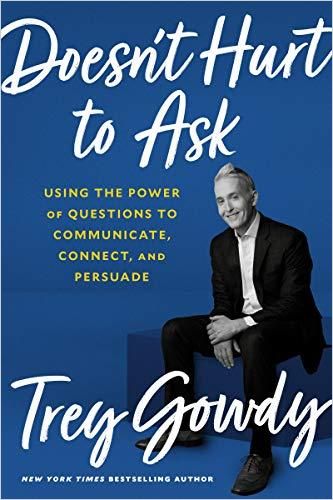Former prosecutor and US Congressman Trey Gowdy offers a slightly political guide to effective persuasion.

Persuasion, Not Debate
Former state and federal prosecutor Trey Gowdy served four terms in Congress representing a district in South Carolina and co-authored the New York Times bestseller Unified. His guide to persuasion and presentation is spiced with anecdotes from his days as a state and federal prosecutor, his eight years in Congress, and his home life. Gowdy explains how to think about facts, develop thoughtful questions, adapt to varying situations, engage your audience, choose your words carefully and learn to know yourself. Whether you’re in a communication-based industry, coping with a difficult managerial role or navigating a complicated conversation, Gowdy offers a reliable road map to improved communication.
Conservative commentators admire Gowdy’s advice. William J. Bennett, the best-selling author of The Book of Virtues, found that this is “a very fine book on the art of persuasion… about finding a purpose bigger than yourself and then moving others toward that purpose with you.” Conservative commentator Sean Hannity, author of the best-selling Live Free or Die, said that Gowdy, “demonstrates how to ask questions to move people and get the answers you need to make decisions and become a stronger communicator.”
Persuasion
Gowdy states at the jump that coercion doesn’t alter a person’s mind. However, constantly harping on an idea might make someone say they agree with you, even if they don’t. Gowdy recommends teaching people various facets of an idea through the questions you ask, how you act and the sincere interest you show.
Life has a way of making you evaluate and revaluate what you believe and why you believe it.Trey Gowdy
Gowdy advocates persuasion instead of debate because it allows considerate listeners who are forthright, but modest, to share their insights. Successful persuasion means bringing about a slow, moderate change in how someone else thinks. The author notes sensibly that you can’t both teach and advocate for something at the same time. He suggests distinguishing between the two goals, and knowing which one you wish to pursue. He laments that in politics today, critics require proof beyond doubt and supporters require no proof. He teaches that neither stance generates effective persuasion.
Sincerity and Facts
If you believe what you say, Gowdy says, others will take you seriously. If you have confidence in what you’re selling, others will, too. Returning to his theme of the current political climate, Gowdy reminds you that hypocrisy may succeed in winning some arguments, but it undermines the forward motion true persuasion requires.
Gowdy calls on you to tell the truth and not lie. Instead, he says, distinguish facts from beliefs, theories, opinions and feelings. Subjective ideas may be relevant to the subject at hand, but he asserts that using facts alone is the best way to build the foundation of your position. When you are trying to persuade someone, Gowdy recommends first establishing rapport, then leading with facts to establish a basis for trust.
Questions
Gowdy posits that asking questions bolsters your argument by making people consider a subject in a different or deeper way. Easy questions typically reinforce an idea, while tough questions point out problem areas.
The world would be a quieter, less hostile place if we replace the desire to shout with the desire to be heard, if we replace the desire to win the argument with the desire to move the person who wants to argue, and if we reserve for ourselves some of the toughest questions we can conjure up.Trey Gowdy
Gowdy says that non-leading questions – who, what, where and when – bring basic information to the surface. These answers, he proposes, establish facts. Leading questions are popular on TV shows and in congressional hearings, Gowdy clarifies, because the interviewers can craft questions as statements which the other person must support or disavow. Such queries, the author recognizes, emphasize the role (and the agenda) of the questioner.
Words
Gowdy advocates beginning a persuasive effort by asking people if they are willing to consider an idea, rather than insisting they should.
Communication and persuasion are hard enough without making unforced errors by choosing a careless word when a more precise word will do.Trey Gowdy
Sometimes, he suggests, try reframing what someone has said. This can show familiar things in a new light – usually a worse one – and if you reframe strategically, Gowdy divulges, that will work to your advantage. Repetition aids retention, and the author reports that he uses it to indicate when something is important.
All of his persuasive techniques and advice will work, he warns, only if you are clear about your beliefs, how you came to believe them and why they matter to you.
Selling
Gowdy evokes something of a self-satisfied salesman in his public presentation and prose. He makes it clear that his tactics are means to an end, so while he promotes honestly and sincerity, Gowdy offers both qualities mostly as arrows in your quiver of methods, not as moral positions. That said, he writes in the simple, straightforward sentences of most self-help books. His words are neither hard to read nor all that original, except for his intriguing stories from inside politics.
A staunch and vocal conservative, Gowdy offers examples of how he applied his persuasive techniques successfully to serve his political goals. Thus, conservative readers are likely to find him well worth emulating, and non-conservatives may be put off. Apolitical readers are likely to draw more objective conclusions and focus on the utility of Gowdy’s counsel.
Those who embrace Gowdy’s advice might also like to read Unified, which he co-authored with US Senator Tim Scott and well as Scott’s Opportunity Knocks, and former president Donald Trump’s The Art of the Deal.












